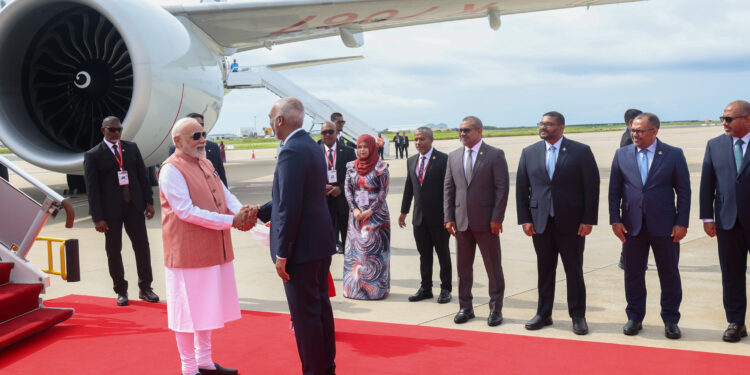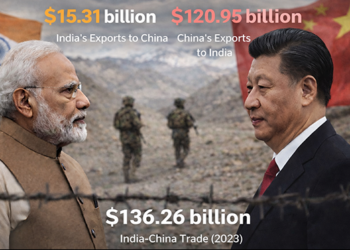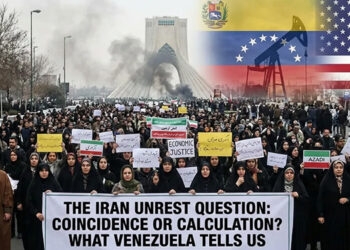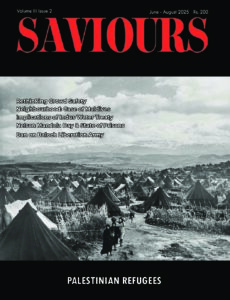Despite initially tense relations when the new Maldivian regime took over, pragmatism and India’s friendly approach, without strings attached, have found acceptance in the Maldives.
NEIGHBOURS ARE A GEOGRAPHICAL REALITY
This is a fact that neighbours are a gift of geography and could be the pains of history. India has a challenging neighbourhood, which is further complicated by the fact that post-independence India shares borders and river water disputes with many of its neighbours, often resulting in contested areas. Some borders, such as those with Bangladesh and Sri Lanka, were settled amicably. They also have a civilisational connection, which enhances expectations vertically. This gets further accentuated by the political dynamics of several Indian states that border these countries, especially Pakistan, Nepal, Bangladesh, and Sri Lanka. Bhutan has generally remained close and calm despite Chinese attempts to cut its own deals. Since India is not only the largest and most powerful South Asian country but also the fastest-growing major economy in the world, it makes it equally attractive to the populace of many of our neighbours, who find sound sustenance and opportunities. Immigration and refugees have also been a challenge, as in several cases, especially in West Bengal and the Northeastern region of India, they could destabilise the population dynamic. Hence, there is a call for addressing this issue more vigorously, especially when the domestic elections are impending. Resolving boundary issues and river water disputes also requires the cooperation of the adjoining Indian state. It becomes difficult for the Centre when the ruling political party in the state is not politically aligned with the central government. These complexities play out on the canvas of neighbourhood policies and often crystallise the divergences more acutely.
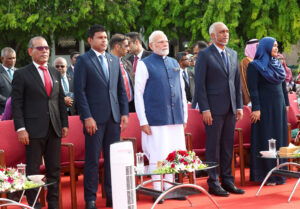
They have congenital problems and suffer from sibling rivalries, similar to humans, and are complicated in their bilateral or multilateral discourse by the historic baggage or external inducements and machinations. Often, land and territorial issues are intertwined with sovereignty and identity dimensions, which become complex due to the engineered domestic politics of the country and the region. India, of a continental proportion and size, is no exception. Several of its neighbours have had a historical nexus and coexisted as part of the whole, even owing their existence to the colonialism of barely 200 years. Both history and geography, as well as extended neighbourhoods, are further accentuated by modern-day competition for their development, security, and influence, especially in smaller countries.
NEIGHBOURHOOD FIRST POLICY
Since SAARC itself has become hostage to Indo-Pak rivalry, given Pakistan’s continued recourse to terrorism as a tool of state policy against India, newer definitions of neighbourhood had to be devised. Hence, the “Act East Policy” with an emphasis on sub-regional cooperation, i.e., BCIM, BBIN, and BIMSTEC, IOR, etc., was blended with the Neighbourhood First Policy in a sub-regional connectivity format, including India‘s North East. Moreover, the “Look and Act West Policy” has strategically engaged and expanded the collaborative matrix with the Middle East, particularly the GCC countries and Israel, achieving unprecedented depth and possibly representing the most significant success of the Modi government’s foreign policy. Prime Minister Modi’s travels to all our neighbours several times and invitations to the leaders at his swearing-in ceremonies since 2014 have demonstrated India’s genuine desire to engage with them. A unique trait of PM Modi and his “ inter-personal touch” with his counterparts has provided an unusual comfort level and understanding, which will reinforce ties in the bilateral and multilateral context and is clearly evident in the enhanced strategic investments, especially from the Gulf, and expanding collaboration in security, defence, and counter terrorism initiatives. Israel has also emerged as a major technological and security partner for India, while India continues to support Palestine in the international fora and through varied bilateral assistance. One should then look at the potential under the Indo-Pacific framework. It is essential to understand that the Neighbourhood First policy has extended its outreach beyond the immediate vicinity.
In any case, since the neighbours are a reality and you have to live with them in tandem and harmony, it is imperative that, being a regional superpower, one has to be magnanimous. This is precisely what India has done by adopting the Neighbourhood First policy in South Asia at least since 2008. Before that, the neighbours also claimed priority in developmental assistance through the Gujral Doctrine, the Indian Technical and Economic Cooperation (ITEC) programme, or infrastructural and budgetary assistance. This primacy is driven by the foreign policy dictum that for India, the economic development of neighbours and political and security stability are equally important for India‘s own growth journey as a global power. Peace is a prerequisite.
Even with Pakistan, which has been driven by highly unproductive anti-India, unifocal cross-border terrorism and zero-sum policies and wars against India, it has been New Delhi’s approach that an economically strong Pakistan was in India’s interest. But Pakistan is an incorrigible Militarocracy whose deep state’s existence depends on an anti-India posture and policies for which J&K is only a ruse. Since they got defeated in all four wars with India during the past seven and a half decades, some four decades ago, they chose cross-border terrorism, extremism and radicalisation as a low-cost modus operandi. It has tried its nuclear blackmail to ignite international interest, but India has called that bluff. Heinous Pahalgam terror attacks, where Pakistan-based “The Resistance Front” (TRF) killed twenty-six innocent tourists based on their religion, met with a decisive kinetic response from India, which launched Op-Sindoor to avenge the nine terror hideouts and camps across Pakistan. Since the Uri attacks in 2016, India has decided to hit the terrorists and their sponsors with decisive might. This is also the reason that SAARC became a laggard since India refused to let the terror-sponsoring Pakistan go scot-free. Today, the relationship with Pakistan is at its lowest, and with Op-Sindoor in continuum against Pakistani cross-border terrorism, it is unlikely to be improved until Pakistan conclusively abjures its nurturing and sponsoring of it.
CHEQUE-BOOK DIPLOMACY VS. NO STRINGS ATTACHED INDIAN RESPONSE
One of the biggest challenges in South Asia is China’s hegemonic, chequebook-driven diplomacy, which aims to essentially encircle India in the region and hinder its global ambitions. It continues to oppose India’s rightful inclusion in the permanent category of the UNSC in the reformed council. Parity is what bothers China and remains unacceptable. Ironically, the GDPs of India and China were broadly identical in the 1980s. Today, China is the second-largest and India the fourth-largest economy, and they are heading to reduce the gap caused by several of our policies and the delayed start of economic reforms, by at least a decade, which has become critical in generating the economic differential. Hence, China and its Sino-Pak axis (iron-clad friendship), as well as the Belt and Road Initiative (BRI), including the China-Pakistan Economic Corridor and strategic investments, such as its String of Pearls strategy in the Indian Ocean, have become a cause of concern for India‘s security and regional influence. In almost all countries, Beijing tries to create hurdles for India through its debt traps and White Elephant projects. By the time our neighbours, such as Sri Lanka and the Maldives, as well as Nepal, realised that the stress factor had increased in their bilateral relationships with India. The Sino-Pak axis has become a two-front threat for India and is a real one. All neighbours, with the sole exception of Bhutan, have bought into the Chinese bait and pie, especially for the BRI, where India has sovereignty concerns.
Most of our neighbours suffer from the ‘Big Brother Syndrome ‘ as far as India is concerned, and under the garb of the strategic autonomy and identity crisis, they fall prey to the Chinese designs conducted with speed and precision. They have become smarter and try to leverage themselves between India and China. Although India has invested billions of dollars in projects and capacity building for its neighbours, the political certainty regarding the outcomes of the non-reciprocal policy remains uncertain. But a realisation has set in that India’s benign foreign policy generosity is something they can bank on in times to come. Bailing out Sri Lanka by providing over $4 billion to support the failing state, which has a vast and prominently Chinese debt burden, has woken them up and is being watched by others.
India also emerged as a first responder and often a net security provider be it water shortages and coup attempts in Maldives, devastating earthquakes in Nepal or terrorist attacks in Sri Lanka or the recurring floods in Bangladesh, or for that matter medicinal and vaccine provision during the pandemic the speed with which India reaches and provides rescue efforts to them is sometimes projected by political opponents as a territorial ingress rather than humanitarian concern and spirit of Vasudhaiv Kutumbakam ( world is one family ) and approach of Prime Minister Modi’s government of ‘Sabka Saath, Sabka Vikas’ especially with regard to the neighbors.
Now, Bangladesh, which has turned into a master piece relationship in the neighbourhood, has become another challenge as the US-China-Pakistan play their dirty games in connivance with the interim Bangladesh government of so-called Chief Adviser Mohammed Yunus after the departure of the ousted long-term leader Sheikh Hasina, who had also stopped listening to the people and the street. Her asylum or interim stay in India has become a new bone of contention between India and Bangladesh, and perhaps the relationship has taken a nosedive. Given Bangladeshi insensitivities, India had to take specific trade and transportation restriction measures. However, on the existential issues affecting the people of Bangladesh, New Delhi continued to meet their requirements to avoid punishing them for the misguided policies of their rulers.
What does India want in return for its non-reciprocal broadband assistance and market access from its neighbours? Simply put, the only thing India expects from all its neighbours is the assurance that their land will not be used against India’s security and core concerns. Not too much to ask for what India does for them. However, in the shifting sands of instability and political volatility in Afghanistan, Myanmar, and Bangladesh, such assurances will be scarce. India cannot dictate or deny any country the right to choose its relationships and partners. Still, if they are driven by evil intent to impinge on Indian security interests, there ought to be certain costs. Despite India having remained clear and committed to assisting its neighbours and not adopting a petty, even if realistic, policy option. Given the political upheavals and changes, as well as occasional anti-India rhetoric emanating from the neighbourhood, some perceive this as a failure of diplomacy and policy. This is far from reality. It is essential to recognise that the state of relations with our neighbours is also contingent upon the leaders and ruling dispensation in a given time frame and is subject to policy fluctuations, as India remains a significant factor in their domestic politics. They will continue to redefine their own strategic calculus and importance in the regional game of thrones, even as there are no permanent friends or enemies, and only interests are essential. Each country and its political leadership, at a particular period, exercises its strategic choices as it deems proper. Sooner or later, they realise what is good for them. It has been observed in several cases among our neighbours, but one of the most notable examples is that of the Maldives, a strategic maritime neighbour.
MALDIVES REVISITED
On July 26, 2025, Prime Minister Narendra Modi attended the 60th Anniversary celebrations of the Maldives’ Independence and the strengthening of our diplomatic ties as the Chief Guest. He also became the first foreign leader to be hosted by President Muizzu since taking over. This is highly significant and indicative of a substantive turnaround in the relationship, as President Muizzu and his political party were known to oppose a closer partnership with India. ‘The India Out’ campaign by his party, and overarching negative remarks, and their desire to get even closer to China, were seen by many as if we had lost the Maldives for good to our competitors. In fact, India-Maldives relations, from the presidency of Maumoon Abdul Gayoom (1978–2008) to that of Ibrahim Mohamed Solih (2018–23), have grown from strength to strength, except the tenure of President Abdulla Yameen (2013–18).
President Mohamed Muizzu followed Yameen’s ideological aversion to India in the early days. His first visits to Turkey and China, rather than to his closest neighbour—India — were indicative of his efforts to rebuff India. Likewise, the conclusion of 20 agreements in Beijing, and the raging controversy over his public demand to India to withdraw a small team of defence personnel stationed there to man an Indian aircraft and two helicopters for the benefit of the Maldivian people, created a challenging situation and public furor in India that turned into a mass boycott of tourism – a vital artery of Maldives. Indians, who had previously constituted the most significant number of tourists, dropped to sixth place, causing substantial tremors for the tourism and allied industries in the Maldives. This alone had a significant impact and forced the new dispensation to look inward and pragmatically consider its own interests.
This visit by the Prime Minister was symbolic and significant, as the Muizzu government, early on, began to realise that India was not only their nearest neighbour but also a friend in need at all times throughout their history. Despite widespread discontent over the ‘India Out’ political campaign and patriotic reaction by an average Indian, even dumping their travel and tourism to Male, the Indian government did not indulge in direct retaliatory or punishing measures. Instead, it continued to provide financial, food and project assistance whenever required and requested by them. PM Modi invited President Muizzu during his swearing-in ceremony in 2024. In his October visit to India, a shared vision for a comprehensive economic and maritime security partnership was announced. That vision is now becoming a reality. As a result, bilateral ties are reaching new heights, and several important projects have been inaugurated, ranging from social housing to connectivity, cybersecurity, defence, and capacity building, as well as the provision of Lines of Credit and grants. Climate Change and counter-terrorism remain the key concerns and areas of cooperation for the two sides.
In a Joint Statement with President Muizzu in Male, PM Modi said ‘This year also marks 60 years of diplomatic relations between India and the Maldives. However, the roots of our relationship are older than history itself and are as deep as the ocean. The commemorative stamp released today, featuring the traditional boats of both our countries, is a reflection of the fact that we are not just neighbours, but also fellow voyagers on a shared journey.” He further added, “India is the closest neighbour of the Maldives. The Maldives holds a key place in both India’s “Neighbourhood First” policy and our MAHASAGAR vision. India also takes pride in being the Maldives’s most trusted friend. Be it natural disasters or pandemics, India has always stood by the Maldives as the ‘First Responder’. Whether it was ensuring the supply of essential commodities or supporting economic recovery following the COVID-19 pandemic, India has always worked hand in hand with the Maldives. For us, it is always friendship first.”
Defence and security cooperation has often been seen as cantankerous by some in the Maldives. However, the fact that India built the Defence Ministry building there, which PM Modi inaugurated, tells a new story of a concrete symbol of trust. India will continue to support the development of the Maldives’ defence capabilities. Peace, stability, and prosperity in the Indian Ocean Region are our shared objectives. Together, through the Colombo Security Conclave, we will strengthen regional maritime security, the PM commented.
ALL WEATHER FRIENDSHIP
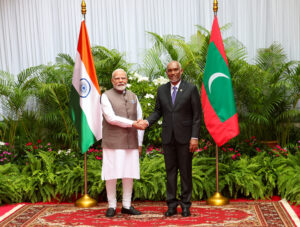
India extended a new line of credit of $ 565 Mn for infrastructure and connectivity projects in this land of a thousand islands, as the PM handed over 3300 social housing units constructed under India’s buyer credit facility to the Maldivians. To address the health care issue, India presented two BHISHM health cube sets. A large number of Maldivians come to India for treatment. Both countries have decided to finalise the Bilateral Investment Treaty as well as the Avoidance of Double Taxation Treaty, creating an institutional framework. With the local currency settlement system, trade can now take place directly in Rupees and Rufiyaa. The rapid adoption of UPI in the Maldives will further strengthen both the tourism and retail sectors. Projects such as the Greater Male Connectivity Project, the Addu Road Development Project, and the redevelopment of Hanimaadhoo International Airport will transform this entire region into a vital hub for transportation and economic activity. Four MoUs and Agreements were signed, which included negotiations on a Free Trade agreement (IMFTA); reduction of annual debt repayment obligations of Maldives; A line of Credit of Rs 4850 Crores ($565 Mn), etc., a network-to-network agreement between India’s NPCI International and the Maldives Monetary Authority to launch India’s Unified Payments Interface (UPI) system in the Maldives. As India has become the hub for Digital Public Infrastructure, an MoU for Digital cooperation was signed. All these are highly significant pedestals for deeper collaboration with a strategic neighbour.
In his departure statement, PM Modi reiterated that “The productive talks with President [Mohamed] Muizzu will add significant energy to our bilateral relations.” The India-Maldives relationship today is a testament to a good neighbourly and mutually beneficial partnership. A quiet diplomacy delivers, as the former President Mohamed Nasheed said, “Muizzu’s government initially came to power with strained relations with India. However, soon after assuming office, he swiftly recalibrated his approach, and we are pleased that relations with India are now back on a positive and amicable footing. India is broad-shouldered and resilient: people may say different things in various quarters, but India has always maintained its strategic focus”. Ultimately, we must remain agile in our diplomatic efforts, as all relationships require mutual respect, mutual interest, and mutual sensitivity.


